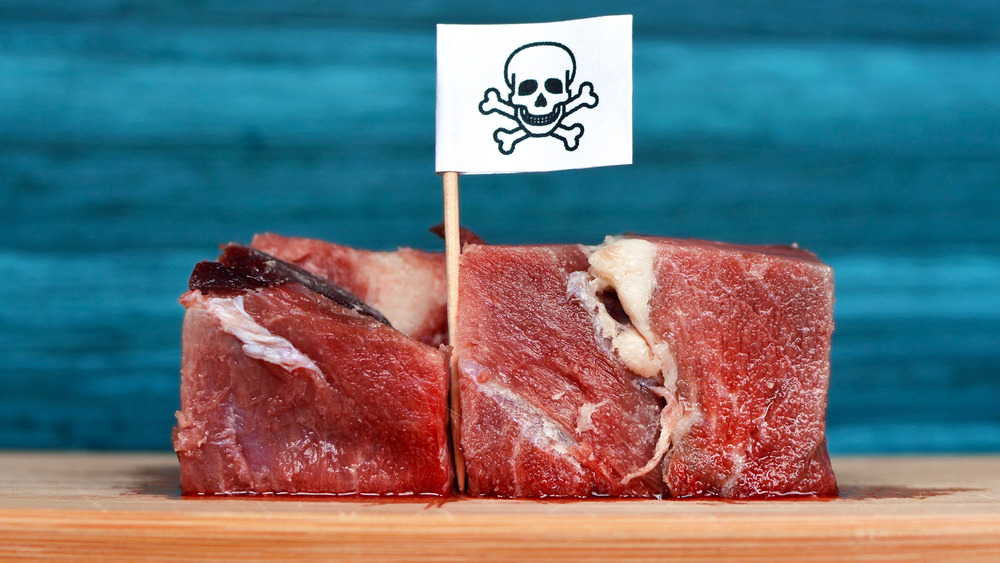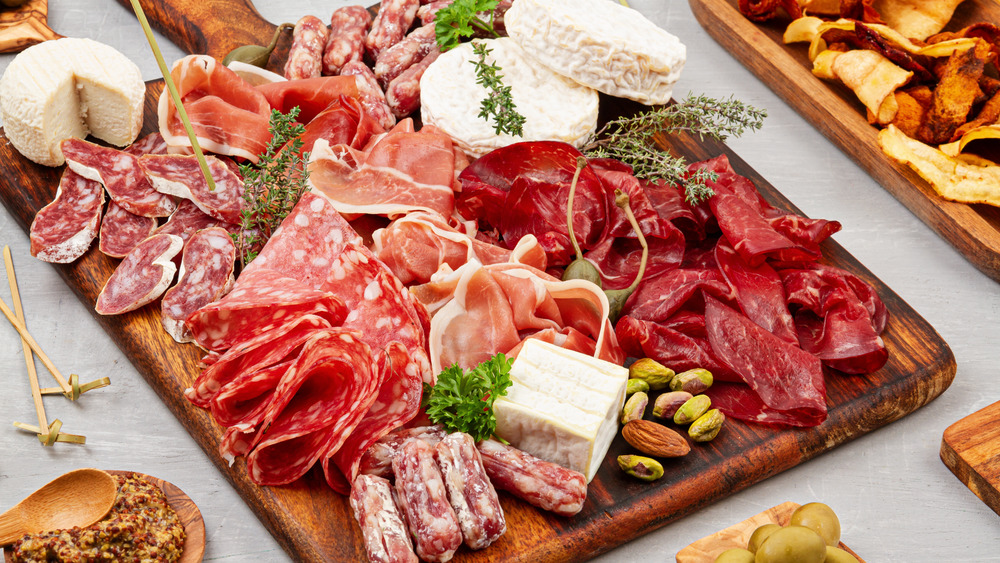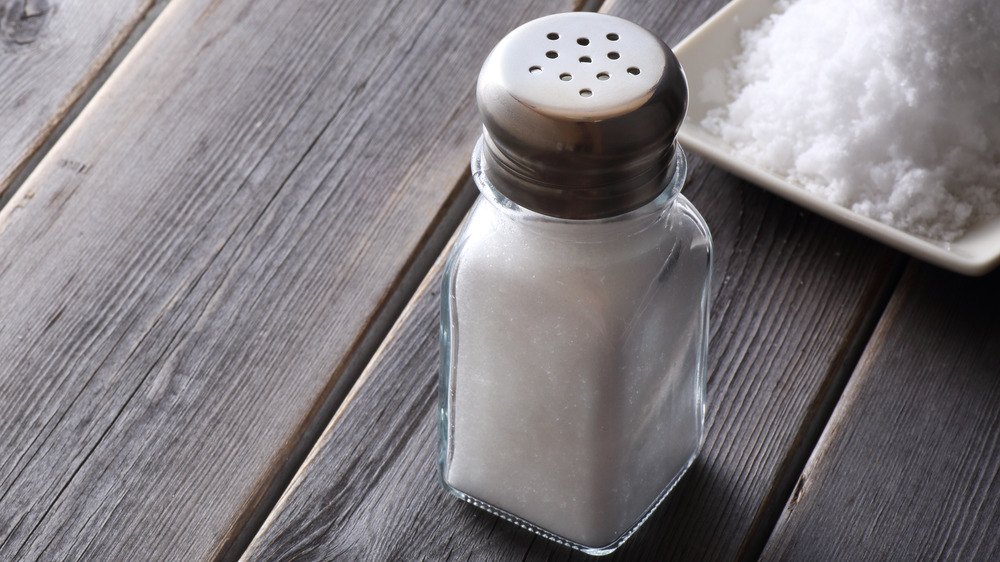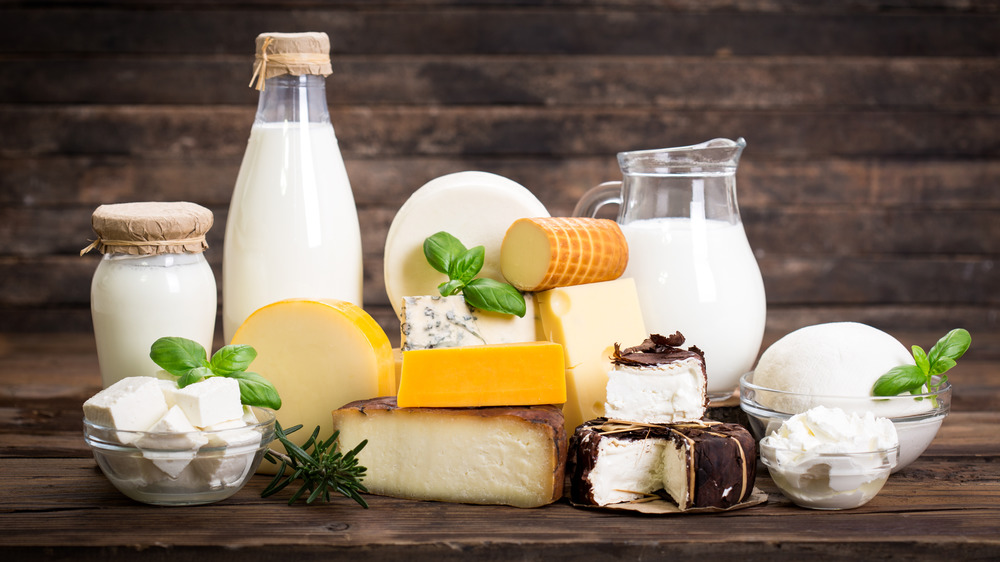You're More Likely To Die Earlier If You Eat These Foods
You're more likely to die sooner if you eat certain foods, science has shown. It may sound hard to believe, but only about 25 percent of longevity is determined by genetics, according to Medline Plus. The rest is dependent on other factors, including what you eat, registered dietitian Elisa Bremner told Health Digest.
Of the top 10 leading causes of U.S. deaths, diet is strongly linked with six: heart disease, cancer, cerebrovascular disease (stroke), Alzheimer's disease, diabetes, and kidney disease. In addition, at least two others could be impacted by diet. Accidental death (which is the third leading cause after heart disease and cancer) can include vehicular accidents, of which 28 percent involve alcohol consumption, according to the Centers for Disease Control and Prevention (CDC). And your chances of dying from Influenza and pneumonia — which together make up the ninth leading cause of death in the U.S. — may also be contingent on your metabolic health, according to the CDC.
Bremner believers that no one specific food will be the death of you (except in the case of, say, botulism or eating a large quantity of foods that are toxic). However, your overall dietary pattern matters. So choose carefully, and be aware of the following foods.
Eating ultra-processed foods can lead you to an early death
If you only eat processed food, now's a great time for a change. A 2020 study published in the Nutrition Journal demonstrated that the more "ultra-processed" food one eats, the higher the risk of dying prematurely from all causes.
So, what is an ultra-processed food? First, it's important to understand that most of the food we eat is, in fact, processed — at least to some extent. Even an apple becomes processed when you put it in the oven to bake it, as a 2017 article in Emerging Technologies for Food Processing explained. The notion of "ultra-processed" food, however, was developed to identify foods that are "formulated" via industrial and chemical processes using multiple ingredients that are themselves processed from compounds that have been extracted from other foods (for example, sugar), according to the Food and Agriculture Organization of the United Nations' "NOVA" system of food classification.
Examples of ultra-processed foods, according to the NOVA system, include carbonated soft drinks, crunchy packaged snacks like potato chips and popcorn, sweet packaged snacks like snack cakes and candy, energy drinks, energy bars, anything with the word "nugget" in its name, powdered soups and drink mixes, fruit-flavored yogurt, margarine, and more.
Drinking a lot of sugar-sweetened beverages makes you more likely to die earlier from any cause
It's long been assumed that drinking sugar-sweetened beverages is unhealthy. However, a 2019 study published in the journal, Circulation, sought to determine whether there was a link between drinking sugar-sweetened beverages and premature death. Crunching the numbers on a group of over 37,000 men and 80,000 women who were free from chronic illness at the start of the study, the authors discovered that consumption of sugar-sweetened beverages was, in fact, positively associated with mortality (in the case of this cohort, primarily through cardiovascular disease). The more sugar-sweetened beverages consumed, the greater the risk of death.
This does not likely come as a surprise to those who've been keeping up with the health risks associated with drinking too much soda, but it's a hard statistic to swallow if you haven't given much thought to the habit. Thankfully, though, once you quit drinking soda and other sugar-sweetened beverages, you can improve your health (via Alaska.gov).
Artificial sweeteners aren't doing you any favors
If you've been under the impression that you can help improve your chances for a long life if you cut back on sugar-sweetened beverages by swapping them out for artificially sweetened versions, you might need to sit down for this. What we're about to tell you might seem counterintuitive, but please bear in mind that it's based on clinical scientific studies. Artificially sweetened diet drinks are associated with obesity, as well as with metabolic syndrome, which counts obesity as one of its signposts, according to registered dietitian and health coach Cassie Christopher. Christopher's view is supported by a 2017 study published in Current Gastroenterology Reports.
Obesity and metabolic syndrome (with or without obesity as an underlying condition) are also linked to an increased risk of stroke and cardiovascular disease, according to a 2019 study published in the journal, Stroke. And as such, artificial sweeteners have been linked with shorter lifespans.
The more red meat you eat, the more likely you are to die prematurely
Although there is no question red meat offers essential nutrients, the fact remains that a great deal of scientific evidence suggests our current red meat consumption may harm us, even shortening our lives (via Healthline).
First, there's the fact that regularly consuming red meat is scientifically associated with a higher risk of obesity, which, itself, is associated with a higher risk of premature death, according to registered dietitian Trista Best. Conversely, cutting out red meat entirely has recently been linked to rapid and profound weight loss in people who are already overweight, a 2020 study published in the Journal of the American Medical Association showed.
But it's not just obesity that consumers of red meat should be concerned about. A 2019 study published in Cancer Epidemiology found an increased risk of invasive breast cancer in women who eat red meat. And a 2020 study published in BBA – Reviews on Cancer, which examined the etiology of the increased risk of colon cancer in people who eat red meat, specifically identified "heme iron" as a critical component of red meat that promotes colorectal carcinogenesis (the beginning of cancer formation).
Eating poultry could be shortening your life
"At one time, chicken was touted as the great nutritional answer to red meat," registered dietitian Elisa Bremner told Health Digest. "In fact, the first chicken nugget was invented by a Cornell professor who was hoping to make eating poultry more attractive to more people." But apparently, things have changed since then. These days, Bremner recommends limiting poultry consumption in pretty much the same way she recommends limiting red meat consumption. "Go ahead and eat it," she advises her clients, "but do so less and less often."
What's changed? For one thing, researchers have since learned that poultry is associated with an increased risk of cardiovascular disease, the leading cause of death in the U.S., and all-cause death, as a 2020 meta-analysis published in JAMA Internal Medicine revealed. In addition, it could also be related to all the unhealthy ways we tend to prepare our chicken nowadays.
Before you enjoy that next sandwich, know that processed meats could shorten your life
Noncommunicable diseases, including cardiovascular disease and type 2 diabetes, are responsible for 70 percent of deaths worldwide, according to a 2020 study published in the Nutrition Journal, which demonstrated that "ultra-processed" food is linked to premature death.
Processed meat was analyzed in a 2020 study published in the journal, JAMA Internal Medicine. Having followed the eating habits of a cohort of nearly 30,000 American adults, scientists found that consumption of processed meat was significantly associated with all-cause mortality and cardiovascular disease, the leading cause of death in the United States (via Centers for Disease Control and Prevention).
It's true, however, that not all researchers agree. A 2021 study published in the journal, Nutrients, appears to suggest there's nothing to worry about when it comes to processed meat. But there may be several limiting factors, including the fact that its cohort consisted of only 10,000 Danes, between the ages of 15 and 75.
Foods high in sodium have been linked to higher premature death rates
If you want to live a long and healthy life, you might want to consider putting down that salt shaker. It's long been understood by scientists that diets high in sodium are associated with a variety of adverse health affects that are, themselves, associated with premature death (via Harvard Women's Health Watch). This includes cardiovascular disease.
Additionally, a 2009 study specifically tied sodium consumption to stomach cancer and suggested the connection may be that salt intake has been linked to Helicobacter pylori (H pylori) infection, which has been associated with the development of stomach cancer (via American Cancer Society).
A 2017 study published in the Journal of the American College of Cardiology went on to find a direct relationship between sodium intake and premature death from all causes, noting, "these results are consistent with a benefit of reduced sodium and sodium/potassium on total mortality over a period of over 20 years."
Eating foods with added nitrates can shorten your life
Nitrates are naturally present in green leafy vegetables, like lettuce and bok choy (via WebMD). When you consume foods rich in naturally occurring nitrates, you could be doing your body a favor. Studies have shown that consuming nitrates in this form can help reduce your risk of cancer (which can help improve your chances of living a longer life), according to WebMD.
However, when nitrates are added to foods — as they frequently are in some hot dogs, sausages, bacon, and deli meats — they are associated with increased health risks, including the development of cancer, particularly stomach cancer, according to the American Cancer Society.
"It's not so much nitrates/nitrites per se [that are carcinogenic], but the way they are cooked and their local environment that is an important factor," Kate Allen, executive director of science and public affairs at the World Cancer Research Fund, explained to BBC Future. "For example, nitrites in processed meats are in close proximity to proteins (specifically amino acids). When cooked at high temperatures this allows them to more easily form nitrosamines, the cancer-causing compound."
Eating trans fats can increase your risk of dying early
According to the University of Michigan School of Medicine, there are three main types of fats: unsaturated, saturated, and trans fats. Unsaturated fats are liquid at room temperature and help keep cholesterol levels balanced, which is why they're commonly considered "healthy fats." Saturated fats are solid at room temperature and can raise your cholesterol, but they can still be part of a healthy diet if limited to, say, 10 percent of daily calories. And then there are trans fats (aka trans-fatty acids), which have been transformed via "hydrogenation" into an even harder solid than ordinary saturated fat.
Hydrogenation increases a product's shelf life and can improve taste and texture. But trans fats can raise your LDL ("bad") cholesterol and lower your HDL ("good") cholesterol, which increases your risk of heart disease, stroke, and type 2 diabetes (via American Heart Association).
Trans fats also cause inflammation and increase your risk of cancer, according to a 2013 study published in the American Journal of Clinical Nutrition, which established that higher trans fat intake is also associated with an increase in all-cause mortality. In other words, the more you consume trans fats, the more likely you'll die early.
Dairy products might be more dangerous than suspected
Dairy products are rich in calcium, protein, and vitamin D (via Harvard Health Blog). But that doesn't mean they're necessarily "healthy." In fact, some deride dairy products, pointing out that most of us are, at some level, lactose intolerant. That means every time we eat dairy products, we are willingly subjecting our bodies to stress (via Healthline).
While many of us were debating the healthiness of dairy products, a 2020 study raised what may be the most serious concern about dairy products yet. Specifically, the study, which followed the eating habits and the mortality of 2,472 people from Italy between 1985 and 2017, found that those who consumed more dairy products were more likely to have died during the study period.
Of course, it's possible the results of the study could be applicable only to its specific cohort and only to the specific types of dairy products that cohort consumed. And in any event, the study authors pointed out that dairy foods remains controversial and warrant further investigation. In the meantime, perhaps moderation is prudent, at least until more is known.
Those super sweet breakfast cereals can actually kill you
While some doctors sing the praises of eating breakfast, other experts question the morning meal (via Time). It's possible, as Time magazine suggests, that it's not whether or not you eat breakfast, but what you choose to eat when you do eat. If you're choosing sugar-sweetened cereal, you're certainly not doing your body — nor your prospects for longevity — any favors.
Sugar-sweetened cereal, like any food that's high in simple carbohydrates, is a recipe for a blood sugar spike followed by an energy crash. And that's not good for anyone's metabolic health, but least of all for the one in three Americans teetering on the brink of diabetes (via Centers for Disease Control and Prevention). And if that's not enough to put you off sugar-sweetened cereal, consider this: A 2020 study published in Nutrition found that eating ultra-processed foods, like sugar-sweetened cereal, is associated with an increased risk of death from all causes.
Eating fast food could hasten your death
Consumption of fast food has been unequivocally associated with increased mortality risk, as a 2016 study published in the journal, Public Health Nutrition, revealed. In particular, fast food is associated with a higher risk of death from cancer. The same study also suggested, although less clearly, an association between fast food consumption and death from cardiovascular disease.
But if that's not enough to convince you to lay off the Dollar Menu, you might want to consider what a 2005 study published in the journal, Arteriosclerosis, Thrombosis, and Vascular Biology, had to say about fast food. After a lengthy examination into the various dietary issues associated with eating fast food, the study authors concluded that fast food is not only correlated with obesity but is most certainly a cause of obesity. And obesity is linked not only to a shorter lifespan in general, but also an increased risk of stroke and cardiovascular disease, according to a 2019 study published in the journal, Stroke.
The more fried foods you eat, the greater your chances of dying early
Fried food may be delicious, but that's not to say it won't contribute to an early death. For example, in a 2020 study published in the journal, Clinical Nutrition, fried food consumption was linked to the development of coronary artery disease in a large cohort of U.S. Veterans. Coronary artery diseases happens when the vessels supplying blood to your heart become damaged or diseased, according to Mayo Clinic. The more fried foods eaten, the greater the risk. And just to clarify the stakes, coronary artery disease kills one American every 36 seconds, according to the Centers for Disease Control and Prevention.
Fried food has also been linked to a heightened risk of death from all causes in post-menopausal women, but especially cardiovascular-related death, and especially among women between the ages of 50 and 65, according to a 2019 study published in the journal, The BMJ. If that's not enough to convince you, consider that fried foods are high in calories, which can lead to obesity (via Healthline). They're are likely to contain trans fats, which increases your risk of heart disease, stroke, and type 2 diabetes, per the American Heart Association.
Eating this delicacy is all fun and games until someone loses a life
Experts have likened eating the liver of the fugu fish to a "game" of Russian roulette (via The Guardian). A Japanese delicacy, fugu can nevertheless literally kill you. Parts of its body (most notably, the liver) contain a deadly toxin that causes paralysis then death, all while the mind remains distressingly alert and aware, according to the University of Kansas, Center for East Asian Studies. Yet anyone preparing fugu can never really know whether they've successfully extracted all the poison until someone (you?) eats the fugu. And since there's no reliable antidote, that meal could wind up being your last.
The bottom line here is not that you should avoid living your dreams or even avoid eating adventurous foods as a whole. It's just that in the interest of living the longest and healthiest life possible, you should carefully weigh the risks of what you eat.















